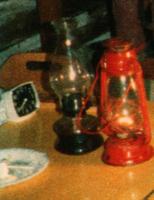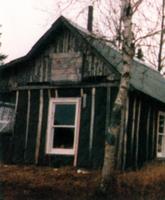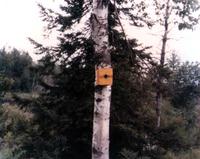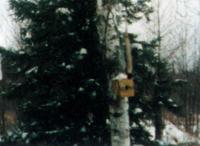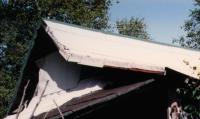a nice supper
While grandad's cooking style did no favors for a fried egg breakfast, it seemed well suited to a hearty north woods supper. I think every time I went hunting with him, he would pick out a big corned beef brisket at the IGA grocery store during a trip to town for supplies. He'd put it in a large oval enamelware roaster in the morning, add some water, put the lid on and leave it on the wood stove in the kitchen to simmer all day.
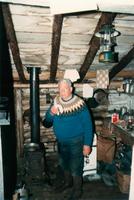 When we would come in from hunting after sunset, which was usually around five in the evening, he'd get me to light the gas oven and set it to about 350. He would cut up some potatoes, carrots, turnips and an onion or two and put them in the roaster next to the corned beef, add salt, pepper and some more water and put it in the oven. He might pour a can of green beans or peas into a pot and set it on the wood stove to warm up while the oven did its work.
When we would come in from hunting after sunset, which was usually around five in the evening, he'd get me to light the gas oven and set it to about 350. He would cut up some potatoes, carrots, turnips and an onion or two and put them in the roaster next to the corned beef, add salt, pepper and some more water and put it in the oven. He might pour a can of green beans or peas into a pot and set it on the wood stove to warm up while the oven did its work.
The activities of the day, which might have included bringing in water from a hole in the ice on the lake, bringing in firewood from the stack outside and walking around in the snowy woods, would usually cause a substantial appetite to be built up. I was usually hungry by the time I got back to the cabin, becoming more so with each passing minute, as delicious smells wafted from the oven. I would have my fork at the ready as grandad finally brought in a platter with a large corned beef brisket surrounded by baked root vegetables, and a dish of some green vegetable. Sure, maybe the bottom of the brisket might be burned a little, or one side of the potatoes might be blackened from a little too much oven time, but it mattered little.
Every time we had this meal, I remember eating serving after serving, sometimes surprising myself at the amount of food I put away. It always seemed to be the most delicious thing imaginable, maybe partially because I was so hungry, and it was in front of me, but mostly because it was most delicious. The corned beef, having slowly cooked all day, would be tender and juicy, and the potatoes and carrots would be flavored by the onion and the corned beef.
I had no great love for turnips, so I would try to avoid them, but when you're eating by the light of a kerosene lamp, sometimes it's difficult to tell the difference between a piece of carrot and a piece of potato, so they were at times unavoidable. But another slice of corned beef would easily erase the taste of turnip from my palate.
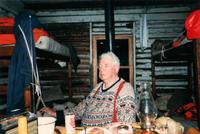 Sometimes I'd eat enough to feel quite full, and have just one more small serving. Then I'd be feeling a little bit over full, but I'd still be thinking, "Just one more small serving."
Sometimes I'd eat enough to feel quite full, and have just one more small serving. Then I'd be feeling a little bit over full, but I'd still be thinking, "Just one more small serving."
I'd have to remind myself that someone was going to have to clear the table and wash the dishes after dinner, and that would probably be me, so I should stop having just one more small serving before I was completely immobilized from overconsumption.
 When we would come in from hunting after sunset, which was usually around five in the evening, he'd get me to light the gas oven and set it to about 350. He would cut up some potatoes, carrots, turnips and an onion or two and put them in the roaster next to the corned beef, add salt, pepper and some more water and put it in the oven. He might pour a can of green beans or peas into a pot and set it on the wood stove to warm up while the oven did its work.
When we would come in from hunting after sunset, which was usually around five in the evening, he'd get me to light the gas oven and set it to about 350. He would cut up some potatoes, carrots, turnips and an onion or two and put them in the roaster next to the corned beef, add salt, pepper and some more water and put it in the oven. He might pour a can of green beans or peas into a pot and set it on the wood stove to warm up while the oven did its work.The activities of the day, which might have included bringing in water from a hole in the ice on the lake, bringing in firewood from the stack outside and walking around in the snowy woods, would usually cause a substantial appetite to be built up. I was usually hungry by the time I got back to the cabin, becoming more so with each passing minute, as delicious smells wafted from the oven. I would have my fork at the ready as grandad finally brought in a platter with a large corned beef brisket surrounded by baked root vegetables, and a dish of some green vegetable. Sure, maybe the bottom of the brisket might be burned a little, or one side of the potatoes might be blackened from a little too much oven time, but it mattered little.
Every time we had this meal, I remember eating serving after serving, sometimes surprising myself at the amount of food I put away. It always seemed to be the most delicious thing imaginable, maybe partially because I was so hungry, and it was in front of me, but mostly because it was most delicious. The corned beef, having slowly cooked all day, would be tender and juicy, and the potatoes and carrots would be flavored by the onion and the corned beef.
I had no great love for turnips, so I would try to avoid them, but when you're eating by the light of a kerosene lamp, sometimes it's difficult to tell the difference between a piece of carrot and a piece of potato, so they were at times unavoidable. But another slice of corned beef would easily erase the taste of turnip from my palate.
 Sometimes I'd eat enough to feel quite full, and have just one more small serving. Then I'd be feeling a little bit over full, but I'd still be thinking, "Just one more small serving."
Sometimes I'd eat enough to feel quite full, and have just one more small serving. Then I'd be feeling a little bit over full, but I'd still be thinking, "Just one more small serving."I'd have to remind myself that someone was going to have to clear the table and wash the dishes after dinner, and that would probably be me, so I should stop having just one more small serving before I was completely immobilized from overconsumption.
